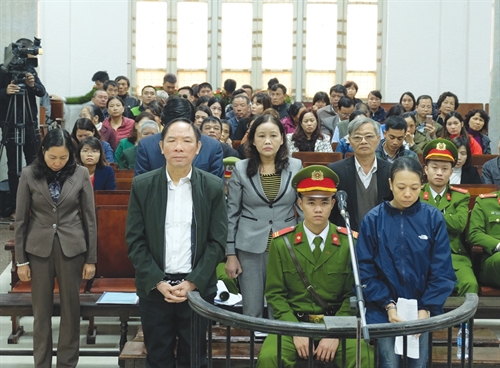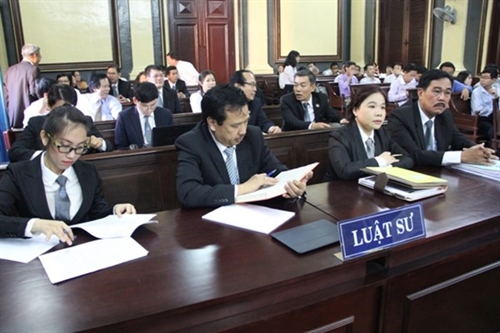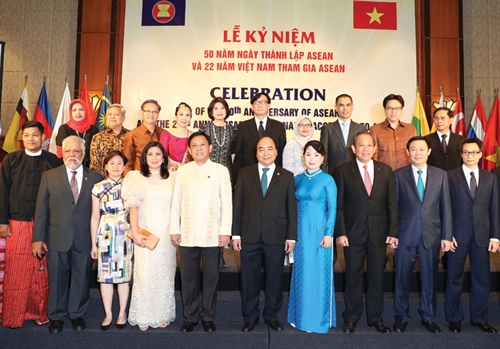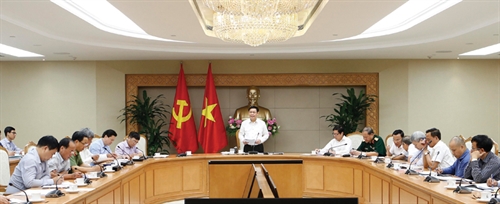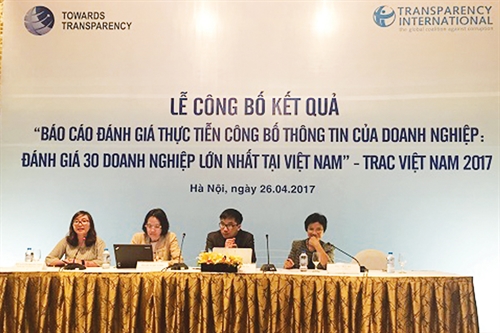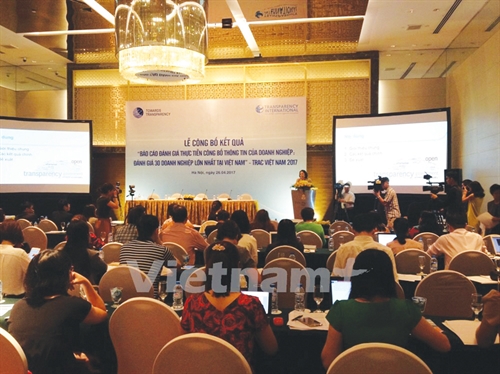At the arrival of New Year 2018, Deputy Minister of Justice Phan Chi Hieu grants an interview to Vietnam Law and Legal Forum on the Government’s legislative work and the Ministry’s key tasks in 2018.
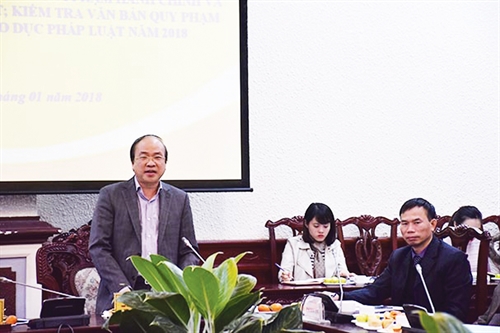 |
| Deputy Minister of Justice Phan Chi Hieu addresses a conference to deploy the Ministry’s work in 2018__Photo: https://www.moj.gov.vn |
What are positive results and limitations of the Government’s lawmaking work in 2017?
In 2017, with the determination to build a facilitative, clean and drastic-action government to support the people and businesses, the Government and Prime Minister considered the building and improvement of institutions, including laws and regulations, a top duty.
A lot of comprehensive measures, including fresh and more drastic measures, were taken to raise the quality and effectiveness of legislative work, such as spending more time on this work at regular cabinet meetings and holding many topical meetings to discuss and approve law and ordinance-making orientations.
Cabinet leaders also held meetings to give opinions on important and controversial bills and determined the responsibility of heads of ministries and agencies for performing the law-making task.
The Ministry of Justice itself closely collaborated with the Government Office in monitoring, urging and inspecting the implementation of the law and ordinance-making program, implementation of laws and ordinances and issuance of implementing regulations.
As a result, lawmaking work recorded many positive results, with a large number of draft legal documents examined and commented by the cabinet and cabinet leaders and many draft laws, ordinances and resolutions passed by the National Assembly or National Assembly Standing Committee.
The delay in the issuance of implementing regulations was reduced to the lowest level in many years. Particularly, all implementing regulations of the Government and Prime Minister were issued on schedule.
Many inappropriate regulations that badly impact the investment and business environment have been detected and revised.
A number of ministries and ministerial-level agencies have actively put forward proposals on making bills relating to land, housing, construction, environmental protection, investment, business, specialized inspection and planning.
Along with the above achievements, lawmaking work still faces some drawbacks. Some bills were still postponed or withdrawn from the legislative program; the quality of some legal documents is not high; and some legal documents of ministries, ministerial-level agencies, People’s Councils and People’s Committees even contain contents which are unlawful or ultra vires.
How has the Ministry performed its major tasks in 2017?
The 2015 Law on Promulgation of Legal Documents (the Law) has many new breakthrough provisions, including those on the process of formulating policies before drafting legal documents. Enforcing this Law, the Ministry of Justice has held four training workshops and 10 refresher courses on lawmaking skills for central and local officials. The Ministry is now finalizing handbooks on policy impact assessment and legal drafting.
Through monitoring activities, the Ministry found out that in 2017 the ministries and ministerial-level agencies properly implemented the process of making legal motions, including reviewing the implementation of laws, formulating policies and assessing their impacts, collecting opinions of agencies and organizations and sending dossiers to the Ministry of Justice for evaluation. At local levels, as the process and procedures for making proposals on resolutions of provincial-level People’s Councils were step by step adjusted to conform with the new provisions of the Law, the proposing agencies also prepared and submitted complete dossiers of local regulations to provincial-level Justice Departments for evaluation and submission to People’s Councils for consideration and approval.
Other new provisions of the Law have been strictly observed by the ministries, sectors and local authorities. Encouraging results have been seen in the implementation of provisions on the competence to promulgate legal documents, posting of lawmaking proposals and draft legal texts on their portals and websites for public opinion, and evaluation of draft legal documents by the Ministry of Justice, provincial-level Justice Departments and legal affairs departments of the ministries and ministerial-level agencies.
Regarding the drafting and finalization of bills, in 2017, the Ministry of Justice was assigned to prepare three bills: the revised Law on State Compensation Liability, the revised Law on Legal Aid, and the Law Amending a Number of Articles of the revised Law on Criminal Records. The first two bills were passed by the 14th National Assembly at its 3rd session as scheduled, conforming with the guidelines of the Party and other laws of the State and meeting the requirements of social management. Particularly, to ensure the draft Law Amending a Number of Articles of the revised Law on Criminal Records, which was commented by the Government in its June 2017 regular meeting, be consistent with the Law Amending a Number of Articles of the Law on Execution of Criminal Judgments (due to be presented to the National Assembly at the 5th session in May 2018) and relevant laws, the Government already proposed such Law be removed from the list of draft laws to be debated at the 4th session and several more important bills be added to such list. In the coming time, the Ministry of Justice will continue coordinating with related ministries and sectors in finalizing the draft Law on Criminal Records according to the guidelines of the Party and directions of the Government to ensure its best quality.
Regarding evaluation and examination of legal documents, last year the Ministry of Justice appraised 50 legislative motions and 240 draft legal documents. It also examined 4,462 documents, an increase of 1,824 over the 2016’s figure.
The evaluation and examination of legal documents shows that the quality of legal documents has been improved in terms of conformity with the Party’s line and policies and constitutionality, legality, consistency and synchronicity. The drafting and promulgation of legal documents have been carried out in accordance with law. State agencies’ legal drafting skills and techniques have been improved. Legal documents are written in a clearer language, with more specific provisions. Drafting agencies also seriously considered and responded to feedbacks from the public, press agencies as well as relevant stakeholders about the lawfulness, feasibility and practicality of legal documents, thus step and step restricting the issuance of impractical and problematic regulations.
Regarding the issuance of implementing regulations, as I have mentioned above, in 2017, thanks to the Government’s and the Prime Minister’s attention and direction as well as ministries’ and sectors’ efforts, the formulation and issuance of implementing regulations have been accelerated. To date, the Government and Prime Minister have managed to issue all documents under their competence, while ministries still “owe” only nine circulars, lower than the figures of 33 and 14 in 2015 and 2016, respectively. Most of these delayed documents are in the stage of finalization based on evaluation opinions and are expected to be issued soon.
Could you reveal major contents of the justice sector’s program of action in 2018?
In order to implement the Government’s Resolution 01 of 2018 on major tasks and solutions for directing and administering the implementation of the 2018 socio-economic development plan and state budget estimates under the motto of “discipline, integrity, activeness, creativity and effectiveness,” the Ministry of Justice has issued a program of action with four objectives and eight groups of major tasks.
One of the most general objectives is to create substantial changes in relation to the three breakthroughs identified in the 2011-20 socio-economic development strategy, attaching importance to formulating and improving institutions for development of a socialist-oriented market economy and drastically implementing solutions to increasing the effectiveness of law enforcement.
In the field of law making and enforcement, the Ministry will accelerate the building and improvement of the legal system in combination with law enforcement with a view to raising the effectiveness and efficiency of state management work. We will also strive to well prepare and organize the implementation of the 2019 legislative program and evaluate legislative motions and draft legal texts so as to ensure the quality and avoid overlaps and inconsistencies in the legal system, and enhance the accountability of management agencies for legislative work. In addition, the ministry will continue to attach importance to the enforcement of laws, especially those newly passed by the National Assembly.
The Government has demonstrated strong determination to build institutions. What are the Ministry’s solutions for accelerating the administrative and judicial reforms as a major task in building a facilitative and drastic-action government in support of businesses and people?
In 2018, the Ministry of Justice in particular and the justice sector in general will focus on two groups of central tasks.
First, we will advise the Government, ministries and ministerial-level agencies in well preparing and implementing the National Assembly’s lawmaking programs for 2018 and 2019, focusing on laws to concretize the resolutions of the 5th and 6th plenums of the Central Party Committee on improvement of institutions of a socialist-oriented market economy and administrative and judicial reforms.
Second, we will promote law enforcement activities in combination with effectively implementing the program on law dissemination and education during 2017-21 and the scheme on renovation of law enforcement activities. The justice sector will try its best to actively make legal policies, detect and deal with documents which are unlawful or impractical, and basically put an end to the delayed issuance of implementing regulations.
In order to make active contributions to the building and improvement of institutions serving administrative and judicial reforms, the Ministry of Justice will apply a raft of comprehensive solutions, focusing on strengthening the apparatuses of judicial and legal affairs agencies together with raising professional and ethical qualifications of judicial and legal officers, especially lawmakers. The Ministry will also concentrate on evaluating legislative motions as a measure to increase the quality of legislative work, particularly closely controlling the establishment of administrative procedures in legal documents. Additionally, we will continue to reform administrative procedures in the fields managed by the Ministry and justice sector, apply information technology in a more practical and effective manner, and change our working styles so as to improve performance quality in all aspects.- (VLLF)

